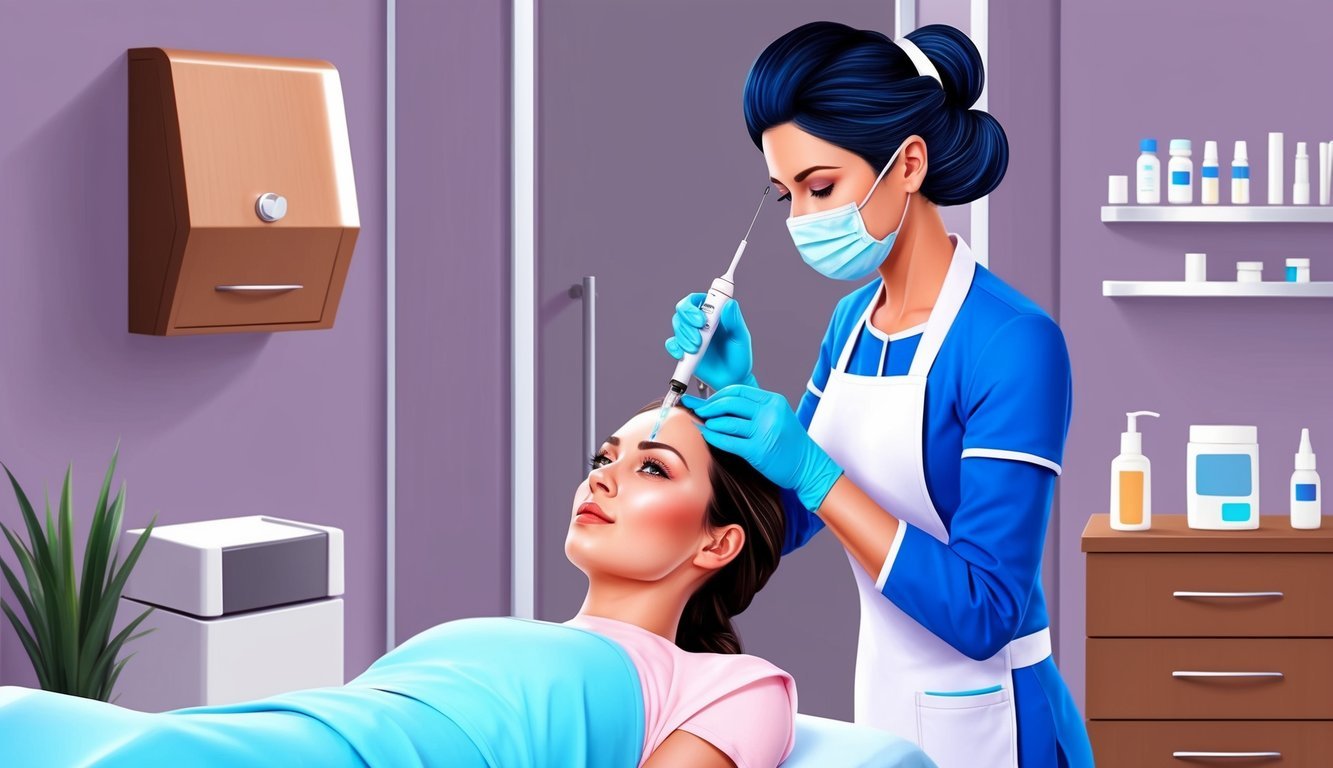As a nurse injector, you play a vital role in enhancing the aesthetic appeal and confidence of your patients.
This specialized field combines nursing skills with artistic techniques to provide various cosmetic treatments, making you an essential expert in the beauty industry.
With the demand for aesthetic procedures rising, trained nurse injectors are increasingly sought after for their expertise in administering treatments, such as Botox and dermal fillers.
Becoming a nurse injector involves a clear educational path and specific credentials.
You will need to acquire comprehensive knowledge through targeted training programs that include hands-on experience.
Continuous professional development is also crucial, as staying updated with the latest techniques and trends ensures you can offer the best care and results to your patients.
In this article, you will discover what it takes to become a nurse injector, the aesthetic procedures you can offer, and the ethical considerations in this rewarding career.
Key Takeaways
- Nurse injectors enhance patient appearance through cosmetic procedures.
- Proper training and credentials are essential for success in aesthetics.
- Staying current with industry trends can enhance your professional development.
The Role of Nurse Injectors
Nurse injectors play a vital role in cosmetic treatments, focusing on patient care and safety.
They utilize their expertise to provide aesthetic services while collaborating with other healthcare professionals.
Scope of Practice and Responsibilities
As a nurse injector, your primary responsibility is performing aesthetic procedures, including neurotoxin and dermal filler injections.
Your role is usually defined by state regulations that outline the scope of practice.
To start, you must hold an active RN or NP license.
Completion of accredited training programs in cosmetic treatments is essential.
Training also covers techniques, patient assessment, and emergency procedures.
Your day-to-day activities may include:
- Conducting detailed patient consultations
- Assessing patient needs and desires for cosmetic outcomes
- Administering injectables safely and effectively
In some states, injectors must work under the supervision of a physician or experienced provider.
Always stay updated on current laws to ensure compliance.
Collaboration with Healthcare Professionals
Working as a nurse injector means you often collaborate with a range of healthcare professionals, including MDs, PAs, and DOs.
This teamwork is crucial for delivering the best patient care.
Your collaboration might involve discussing treatment plans or sharing patient progress.
Being aligned with doctors helps create a safe and efficient treatment environment.
Regular communication with your team ensures:
- Patients receive personalized care
- Concerns are addressed promptly
- Best practices are followed
You may also refer patients to specialists for any underlying medical conditions.
This approach enhances the overall quality of care.
Patient Safety and Care
Patient safety is paramount in your role as a nurse injector.
You are responsible for creating a safe space for procedures and addressing any potential complications.
Before any treatment:
- Conduct thorough patient assessments
- Review medical history, allergies, and prior surgeries
- Discuss possible risks associated with injectables
Monitoring patients post-treatment is equally important.
You should observe for immediate side effects and educate patients on aftercare.
Being aware of signs of adverse reactions can help you respond quickly and effectively.
Your focus on patient safety ensures a positive experience and outcomes for everyone involved.
Educational Pathways and Credentials
To become a nurse injector, you need to follow specific educational pathways and obtain the necessary credentials.
This involves earning a nursing degree, gaining licensure, and pursuing additional certifications in aesthetic training.
Nursing Degrees and Licensure
To start your career as a nurse injector, you must first obtain a nursing degree.
Options include:
| Degree Type | Description |
|---|---|
| Associate Degree in Nursing (ADN) | A two-year program that prepares you for the NCLEX-RN exam. |
| Bachelor of Science in Nursing (BSN) | A four-year degree that offers more extensive training and education. |
After completing your nursing degree, you must pass the National Council Licensure Examination for Registered Nurses (NCLEX-RN).
This exam evaluates your knowledge and skills in nursing practice.
Obtaining your RN licensure is crucial, as it allows you to work as a registered nurse before specializing in aesthetics.
Additional Certifications
Once you are a licensed registered nurse, consider obtaining additional certifications to enhance your qualifications.
Popular credentials include:
- Certified Aesthetic Nurse Specialist (CANS): Focuses on aesthetic procedures and nursing practices.
- Certified Plastic Surgery Nurse (CPSN): Specializes in cosmetic surgery and procedures.
- Dermatology Nurse Certified (DNC): Validates expertise in dermatological care.
- Dermatology Certified Nurse Practitioner (DCNP): For advanced practice nurses focusing on dermatology.
These certifications demonstrate your commitment and expertise in the aesthetic field, making you a more competitive candidate for nurse injector positions.
Nurse Injector Training Programs
After earning your degree and any relevant certifications, you need specialized training.
There are several options for nurse injector training programs:
- Aesthetic Nurse Training: Courses cover techniques for injectables like Botox and fillers.
- In-person Training: Hands-on courses led by experienced professionals are highly recommended for practical experience.
- Online Programs: Flexible options that allow you to learn at your own pace.
Completing a training course helps you gain the skills necessary for performing aesthetic procedures safely and effectively.
By participating in these programs, you position yourself as a knowledgeable and skilled nurse injector in a rapidly evolving field.
Aesthetic Procedures and Techniques

Aesthetic procedures focus on enhancing your appearance through various techniques and treatments.
Understanding the available options and the importance of anatomy can help ensure safe and effective outcomes.
Injectable Treatments and Non-Invasive Options
Injectable treatments are popular choices for non-surgical aesthetic enhancements.
Common options include Botox and dermal fillers.
Botox is a form of botulinum toxin used to smooth wrinkles by temporarily paralyzing facial muscles.
It’s commonly applied to areas like frown lines and crow’s feet.
Dermal fillers, such as Juvederm, add volume to areas like cheeks or lips.
These fillers help in reducing the appearance of age-related wrinkles.
Besides injectables, you might consider laser treatments, which target skin imperfections.
Procedures like chemical peels and dermabrasion improve skin texture and tone.
Non-invasive options like CoolSculpting help reduce fat in specific areas without surgery.
Such methods provide lasting results with minimal downtime.
Understanding Anatomy for Safe Procedures
Knowledge of facial anatomy is crucial for successful aesthetic procedures.
Understanding the underlying structures helps in choosing appropriate injection techniques.
Key anatomical features include:
- Muscles: Know how they interact with injectables like Botox.
- Vessels: Awareness of blood vessels reduces risks of bruising or complications.
- Fat pads: Recognizing fat distribution helps in effectively placing fillers.
Practicing techniques in the correct anatomical locations will improve outcomes and safety.
For effective results, ensure that you are well-trained in the specific injection methods for each treatment, such as those used for filler injections.
Through this understanding, you can provide patients with exceptional care while minimizing risks associated with aesthetic procedures.
Professional Development and Career Progression

As a nurse injector, professional development and career progression are essential for growth in the aesthetic field.
Engaging in networking and learning opportunities can enhance your skills and open doors to new job prospects.
Networking and Professional Organizations
Building a strong network is crucial for your career as an aesthetic professional.
Join organizations such as the American Society of Aesthetic Plastic Surgery or the Aesthetic Nursing Association to connect with peers and industry leaders.
Networking events, seminars, and workshops provide valuable chances to learn about the latest trends in aesthetic procedures.
Attend conferences to meet potential employers, collaborate, and share insights on advancements in aesthetic services.
Utilize social media platforms like LinkedIn to broaden your professional connections and showcase your skills.
You can also participate in local meetups focusing on cosmetic nursing topics.
These events can help you stay informed about job openings in medical spas, dermatology clinics, and plastic surgery offices.
Advancing in Aesthetic Nursing
Advancing your career in aesthetic nursing requires ongoing education and specialization.
Consider pursuing certifications in specific injectables or aesthetic techniques, which can enhance your marketability and expertise.
Training courses are offered by various organizations, preparing you for advanced roles or even leadership positions.
Certifications demonstrate your commitment to the field and can lead to higher pay.
The average annual salary for aesthetic nurse practitioners can range significantly based on experience and location.
Look for mentorship opportunities to learn from seasoned aesthetic professionals.
Mentors can provide guidance on essential skills, help you navigate challenges, and recommend paths for advancement in cosmetic services.
Focus on continuous learning and adapting to new technologies to ensure success in your aesthetic nursing career.
Legal Aspects and Ethics in Aesthetic Nursing
Aesthetic nursing involves important legal and ethical considerations.
These include patient consent, confidentiality, and understanding practice restrictions.
Awareness of these aspects is vital for providing safe and effective care.
Patient Consent and Confidentiality
Patient consent is crucial in aesthetic nursing.
Before any treatment, you must ensure that clients fully understand the procedures, risks, and benefits.
This includes discussing what to expect during and after the treatment.
Confidentiality is equally important.
You should protect patient information at all costs.
Adhering to privacy regulations is not just an ethical duty but also a legal requirement.
This is especially significant in aesthetic practices, where personal appearance and health details are sensitive.
Make sure to use secure systems to store and manage patient records.
Practice Restrictions and Liability
In aesthetic nursing, there are specific practice restrictions that must be followed.
These vary by location and may include regulations on what treatments you can perform.
As a registered nurse, you typically work under the supervision of a licensed physician.
Understanding your scope of practice helps reduce liability.
It is essential to be well-informed about your legal responsibilities, especially when using neuromodulators and other cosmetic products.
Regularly updating your knowledge through training or courses, such as those offered by the Plastic Surgical Nursing Certification Board, can ensure compliance and enhance your skills.
Frequently Asked Questions
In this section, you will find important information about becoming a nurse injector.
Topics include qualifications, salary ranges, job responsibilities, training, and career opportunities in this field.
What qualifications are required to become a nurse injector?
To become a nurse injector, you typically need to be a registered nurse (RN) or an advanced practice registered nurse (APRN).
Most states also require specific certification in cosmetic procedures.
Completing specialized training and gaining experience in aesthetic procedures is essential.
What is the typical salary range for an aesthetic nurse?
The salary for an aesthetic nurse can vary widely based on location, experience, and the type of employer.
Generally, the salary can range from $60,000 to $120,000 annually.
Higher salaries are often found in urban areas or in medical spas and private clinics.
How can one find nurse injector job opportunities?
To find nurse injector job opportunities, you can explore online job boards, local healthcare facilities, or aesthetic clinics.
Networking with professionals in the field can also help you discover openings.
Additionally, joining professional organizations can provide access to job listings.
What training is involved in the specialization of botox injections?
Training for Botox injections usually involves attending a workshop or course that covers the technique, patient assessment, and safety protocols.
Many programs provide hands-on training with real patients.
Certification from a recognized organization can enhance your credentials.
What are the job responsibilities of an aesthetic nurse injector?
As a nurse injector, your main responsibilities will include conducting patient consultations, administering injectable treatments, and monitoring patient outcomes.
You will also need to maintain patient records and ensure compliance with safety standards and regulations.
What are the career progression opportunities for nurse injectors?
Career progression for nurse injectors can include roles such as lead injector or aesthetic coordinator within a clinic.
Some may choose to specialize further in areas like dermatology or plastic surgery.
Others may pursue opportunities in education or consulting within the aesthetic industry.

